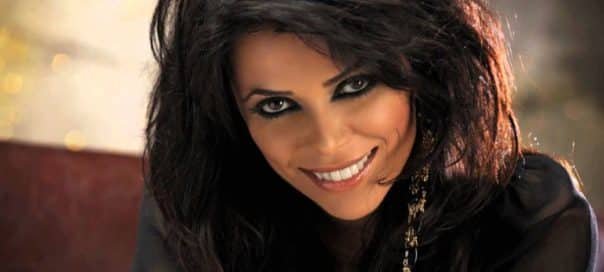The Sephardic songstress has music in her blood.
By Sarah Aroeste

I knew I wanted to interview international Sephardic singer Yasmin Levy about her career in Ladino music. As a Ladino-language musician myself, I have admired Levy’s impressive musical journey for many years. We both represent styles that pay honor to our Judeo-Spanish roots, while also respecting our own musical intuitions and desires to meld other inspirations. Levy, born to Sephardic parents from Izmir, Turkey, grew up in Jerusalem listening to her mother sing. Her late father, who passed away when Levy was just an infant, also left a lasting imprint. Yitzhak Levy was one of the most influential preservationists of Ladino song and Spanish Jewish history. With this backdrop, I spoke to Yasmin, as a fellow artist, about what it means to have Ladino music in your heart and in your blood.
You grew up in a family steeped in Ladino music. Your father, after all, was one of the foremost preservationists in the field, and your mother is a singer. Did their careers influence you?
When I felt in my heart that I wanted to sing, the fact that he was who he was made it more difficult for me, and I did everything I could to avoid becoming a singer. It was a big battle for me. I always said “Who am I to sing? He was a singer, my mom is a singer.” It took me many years to let go. When I did start to sing, I wanted to sing in Hebrew and be young and popular. Then once I was a guest singer at my mom’s show in memory of my father. I just sang one song and my life changed. The Ladino community saw that I’m the new generation and I become their hope. From then on, I just brought the songs from my mother’s kitchen to the studio.
[kopa_blockquote style=»style-1″ quote=»true»] [kb_description]Now I see myself as a butterfly flying from one flower to another, and I spread those songs.[/kb_description] [kb_author]Yasmin Levy[/kb_author] [/kopa_blockquote]
Has your relationship with Ladino changed since singing in it?
Everyone in Israel sang the Ladino songs in a classical way, and treated the songs as very ancient and delicate, something that you need to take care of like an old man. I refuse to sing those songs as something too ancient. Even though they were created 500 years ago, 300 years ago, for me, love is love and pain is pain. I knew I could change the rhythm or musical style, but never touch the lyrics or melodies. Because of being my father’s daughter, my responsibility was bigger. I think he did something much more important than all of us. He saved those songs from dying.
My family was in Turkey for 500 years. When you stay in a place for so many generations, you can’t avoid the music of these places. Now I see myself as a butterfly flying from one flower to another, and I spread those songs.
Your current album, Rak Od Layla Echad, is your first ever in your native tongue, Hebrew. Why did it take so long?
I was afraid of Hebrew. More than that, I could never find the beauty that I could find in Ladino and Spanish. It was the daily language that I buy food at the supermarket — it lost its magic and romance. Then my son Michel was born and I started to read books for him and sing children’s songs, and what happened was that I started to learn to love Hebrew. It took me 36 years to finally be able to express my singing, my feeling, my thoughts in Hebrew.
What other surprise meanings have you found in your career?
My producer, Ben Mandelson, taught me that songs show us where you are in this moment in your life and what you want to express. I never thought of it like that. He suddenly made me think about what I want to tell people about my life now. From that moment on, every song and every album title has a meaning for me. My album Sentir (2009) was at a time when I felt everyone was judging me, journalists, producers. I was feeling like I had to explain myself all the time. When I came to Sentir, I said that’s it. Sentir means to feel. You just feel. I’m going to sing, and then you judge what you feel. It was only then that I realized I don’t want people to put me in a box. I don’t want to explain myself. You can’t explain art. Art comes from madness.
In addition to performing classic Ladino repertoire, you have been writing your own songs for many years now. Where do you find inspiration for your songwriting?
I don’t really have a process. I can go to buy milk at the store and I come back with a milk and a song. It usually starts from one word, and from this I build a story. If I have a word there, that’s the way it was born. I have to respect this word — there’s a reason why this word is in my head now. It’s like a bug flying in my head. Suddenly I have music and I just have to run home and record it and take it out of my head. I have to give birth to it.
I know you don’t like to talk about politics in your music, although you’re known for using music for cross-cultural dialogue. How do you combine Ladino with Turkish and Persian music (and more!) to do so?
I grew up in Jerusalem, a melting pot. I had Moroccan neighbors, Kurdish neighbors. I’m Turkish. There was opera around me, flamenco, Arabic music. I just grew up with these sounds. I guess if I was born somewhere else that would not happen. I didn’t do anything on purpose. I just sang from what is in my heart. This is my blessing, to be born and grow up in Jerusalem. All my life as a singer I worked with people from so many different countries and from different religions. I had a Turkish and an Armenian musician, and even with all their history, they come together and play and hug each other. I’m not a politician. I don’t like to talk politics; I don’t have the right. My answer is come to my show. See my musicians.
Yasmin Levy will perform on Saturday, November 11, at 8 p.m. at the Stroum Jewish Community Center, 3801 E Mercer Way, Mercer Island, in conjunction with Town Hall Seattle and the University of Washington Sephardic Studies Program and Ladino Day. A Q&A with UW’s Professor Devin Naar and Town Hall’s Jon Kertzer will follow the concert. $30
Sarah Aroeste is a singer/songwriter and author who has devoted her career to Ladino cultural preservation. Her upcoming English/Ladino holiday album, Together/Endjuntos, will be released this fall.
By Sarah Aroeste
Fuente: Jewish in Seattle – mag.jewishinseattle.org
 eSefarad Noticias del Mundo Sefaradi
eSefarad Noticias del Mundo Sefaradi

